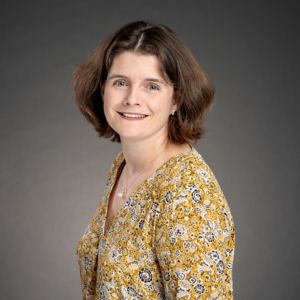St. Jude Family of Websites
Explore our cutting edge research, world-class patient care, career opportunities and more.
St. Jude Children's Research Hospital Home

- Fundraising
St. Jude Family of Websites
Explore our cutting edge research, world-class patient care, career opportunities and more.
St. Jude Children's Research Hospital Home

- Fundraising
Investigator Insights: Taking a Leap with Lily Guenther, MD
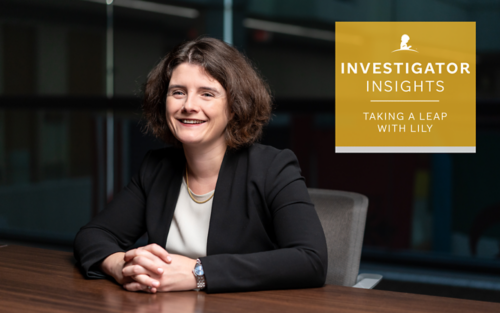
Lily Guenther, MD, reflects on 2022, a year where she took a defining leap in her career and started her own laboratory in the Division of Molecular Oncology at St. Jude.
In science, there is no neat-and-tidy end point, no clear beginning and end. An investigator continually collects data to formulate new questions. It is a process marked by persistent curiosity and ongoing analysis.
As a physician-scientist in training, I spent the past several years engaged in the scientific method, both at the bench and the bedside, interpreting data and charting next steps for my patients and research initiatives. When an opportunity arose to start my own laboratory at St. Jude in early 2022, the choice to go to Memphis felt both exhilarating and daunting. At the time, I was working among a remarkable network of scientific and clinical colleagues in Boston, a city I had called home for more than a decade. And as the pandemic bubbled along, the upheaval of a move was more complex with a partner, infant daughter and toddler son at home.
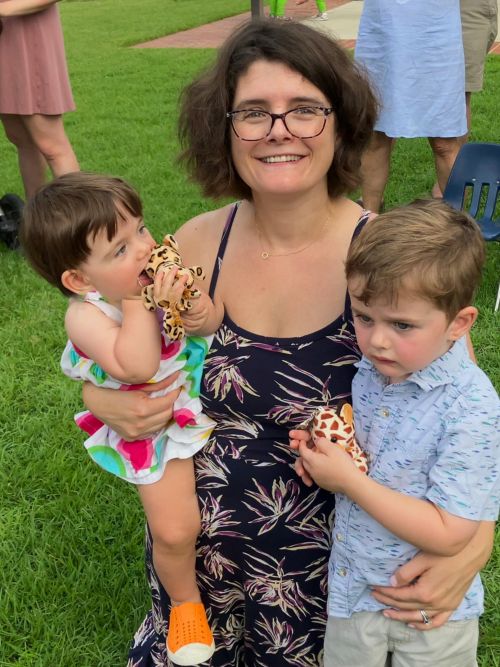
Lily Guenther, MD, and her two kids enjoy summer activities. Photo provided by Lily Guenther.
Was this the right decision for me and my family? To determine my next steps, I relied on the methods I constantly employ in science. After I carefully considered the multidimensional elements at play with colleagues, friends and loved ones, the scientific potential of this new opportunity revealed itself as the obvious choice. So, I took a leap.
Imposter syndrome is a real thing, particularly for women and underrepresented minorities in science and medicine, to which I am not immune. The syndrome has afflicted me throughout adulthood. I questioned my abilities to lead a research group when I was making my decision to come to St. Jude, and if I am completely honest, there are many days I still don’t feel ready. But the feeling of uncertainty is offset by the thrill of coming to St. Jude every day and working to advance the science I love.
I was welcomed as an Assistant Member (assistant professor equivalent) in the Division of Molecular Oncology in August 2022 and given the space and resources to study novel genomic targets in osteosarcoma – a rare pediatric tumor – with the goal of eventually identifying new therapies for patients. From the outset, the road was paved so I could start quickly. St. Jude helped me hire a staff scientist before I arrived, which enabled me to quickly set up the lab. It sounds minimal, but it was critical in those early days.
Just a little over four months into my new venture, I have no major discoveries or publications to report (yet). But the lab is stocked, and our experiments are progressing. Because of the uniquely collaborative nature of St. Jude, the groundwork I have laid feels significant.
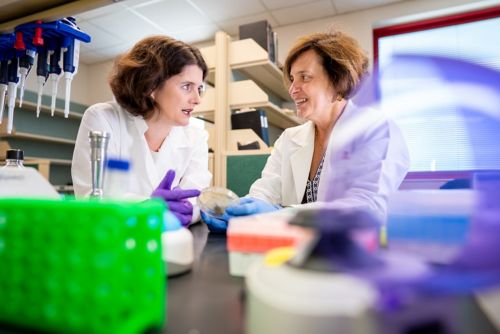
Lily Guenther, MD, and staff scientist Monika Wierdl, PhD, work at the bench.
I have quickly become integrated with the Pediatric Cancer Dependencies Accelerator, an extraordinary scientific collaboration between my old and new institutions. Additionally, I have been able to form two promising collaborations with faculty members at St. Jude who have an interest in understanding osteosarcoma biology.
The ability to develop these partnerships in such a short time is a testament to the distinctive research environment at St. Jude. I am honored to be part of it.
Beyond the lab, I have long-term goals to build leadership skills, and I continually seek senior mentors, particularly women physicians and scientists. These grounding forces of support, both old and new, are essential as I build my career and combat feelings of uncertainty after leaving the nest and starting my own research venture.
It has been tough not to have my amazing postdoc mentor, Dr. Kimberly Stegmaier, there to guide me every day. I must troubleshoot decisions and find my own answers in a largely unknown landscape. Thus, I am learning how to ask for help in my role as principal investigator and aspiring scientific leader.
The need for support extends outside the walls of St. Jude. Deciding to move, even for the opportunity of a lifetime, was a major one. We left the comfort of our close-knit extended family and friends all in the name of science. It has not come without its challenges.
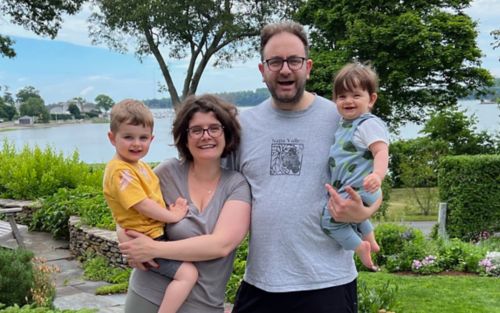
Lily Guenther, MD, and her partner, Brian Meyers, enjoy time with their two children before their move to Memphis. Photo provided by Lily Guenther.
Moving from the Northeast to the South has been a bit of a shock, but one that the culture of Memphis itself has helped alleviate. There is an incredible community here. Not just at St. Jude, but in our neighborhood, our kids’ school and in our Jewish community. The fabric of life we have found here is remarkable.
Though there are trying days, I am grateful to be here. Situated against the backdrop of the Mississippi Delta, in this extraordinary Memphis community, my family and I embrace new beginnings. Supported by the incredibly rich scientific community of St. Jude, I can now embark on a professional journey that I envision as defined by exciting science and meaningful new discoveries. In this leap, there is endless possibility.
